On the Ballot: The Equal Rights Amendment Will Protect Abortion Rights in NYS
- Details
- Written by: Joanne Wallenstein
- Hits: 1719
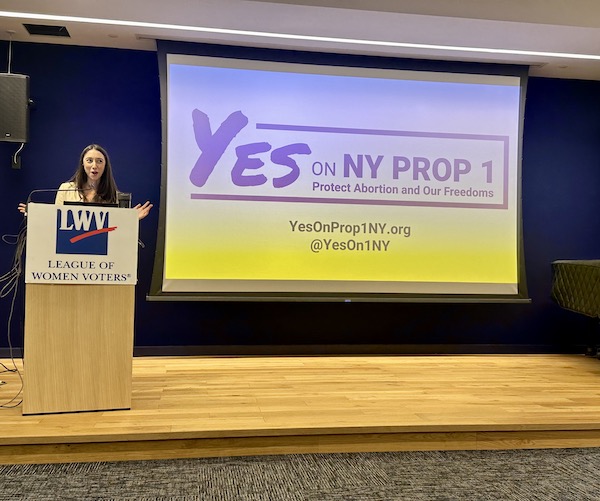 Jenna Lauter of the NY Civil Liberties Union Urged Voters to Approve Proposition 1 on the NYS Ballot in November (Photo Credit Michelle Lichtenberg)
Jenna Lauter of the NY Civil Liberties Union Urged Voters to Approve Proposition 1 on the NYS Ballot in November (Photo Credit Michelle Lichtenberg)
This year’s election is a pivotal one for many reasons. First it’s a presidential election year at a time when our democracy hangs in the balance. For those of us living here in Congressional District 16, we have the opportunity to elect our longtime County Executive George Latimer to represent us in Washington – and there’s more.
And at long last, the Equal Rights Amendment will be on the reverse side of the ballot in New York State. The amendment, which is Proposal 1, will safeguard abortion rights in New York State and offer many more protections against discrimination by the government based on ethnicity, national origin, age, disability and sex, including sexual orientation gender identity and expressions, pregnancy and pregnancy outcomes.
In order to inform voters, the League of Women Voters of Scarsdale invited Jenna Lauter from the NY Civil Liberties Union to address locals at the Scarsdale Library on Tuesday night October 1, 2024.
Lauter explained that many in New York think our rights are already protected and say, “Why do we need this?” Lauter said, “When Roe vs. Wade fell, we were shocked and we realized our rights aren’t as safe as we thought.” And the election of a conservative governor or state legislature could put these rights in risk. This new amendment protects abortion as a right as a part of the clause against sex discrimination.
Lauter said, “Proposition 1 goes far beyond reproductive rights. It creates a vision for what it means to be equal in our society. It enshrines text against government discrimination for all groups.
She pointed out that the text on the ballot does not mention abortion. Instead Proposition 1 is defined as an “Amendment to Protect Against Unequal Treatment,” but if passed by a simple majority it will protect the right to abortion in New York State.
Here is the text of the amendment:
A. No person shall be denied the equal protection of the laws of this state or any subdivision thereof. No person shall, because of race, color, ethnicity, national origin, age, disability, creed [or], religion, or sex, including sexual orientation, gender identity, gender expression, pregnancy, pregnancy outcomes, and reproductive healthcare and autonomy, be subjected to any discrimination in [his or her] their civil rights by any other person or by any firm, corporation, or institution, or by the state or any agency or subdivision of the state, pursuant to law.
B. Nothing in this section shall invalidate or prevent the adoption of any law, regulation, program, or practice that is designed to prevent or dismantle discrimination on the basis of a characteristic listed in this section, nor shall any characteristic listed in this section be interpreted to interfere with, limit, or deny the civil rights of any person based upon any other characteristic identified in this section.
Lauter urged voters to turn over their ballots and vote yes on Proposition 1 -- and to inform family and friends that this critical amendment is on the ballot on November 5, 2024.
For those choosing to vote in person, in-person early voting is October 26-November 3, 2024, at any of the early polling locations in Westchester County. Election Day is November 5, 2024. Then, voters must vote at their designated polling location.
Behind Closed Doors
- Details
- Written by: Joanne Wallenstein
- Hits: 1535
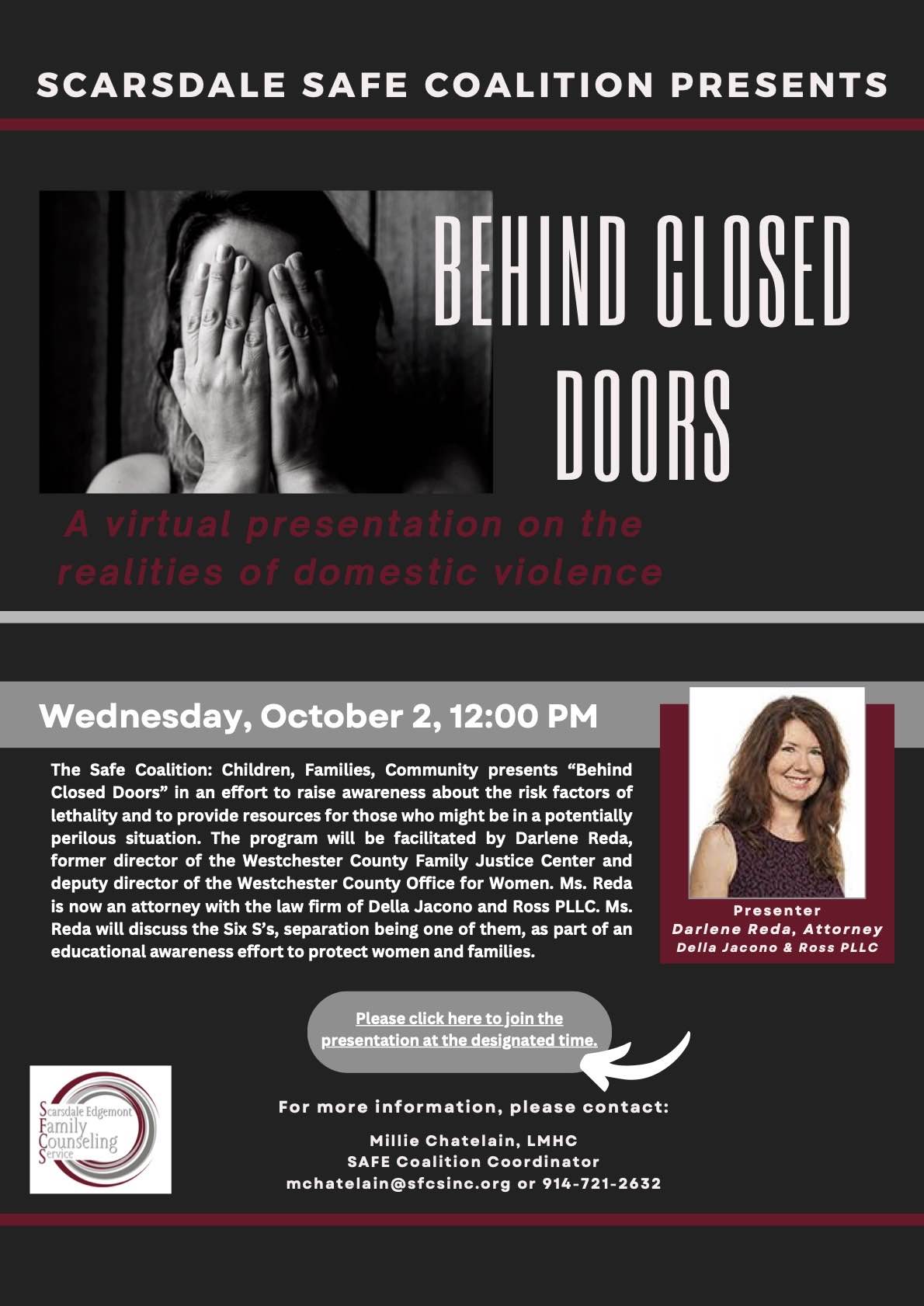 The reality of domestic violence is that it can sometimes be lethal. One of the misconceptions of domestic violence is that it doesn’t happen in upscale suburbs such as Scarsdale; sadly, however, no neighborhood is immune from domestic violence. While it’s impossible to know what goes on in other people’s homes, learning to identify the risk factors that are correlated with domestic lethality, just may save a life. The decision to separate, for example, is known to be the most dangerous time for a victim of domestic violence, a time when the perpetrator typically feels most out of control.
The reality of domestic violence is that it can sometimes be lethal. One of the misconceptions of domestic violence is that it doesn’t happen in upscale suburbs such as Scarsdale; sadly, however, no neighborhood is immune from domestic violence. While it’s impossible to know what goes on in other people’s homes, learning to identify the risk factors that are correlated with domestic lethality, just may save a life. The decision to separate, for example, is known to be the most dangerous time for a victim of domestic violence, a time when the perpetrator typically feels most out of control.
One in 4 women and 1 in 9 men experience severe intimate partner physical violence, intimate partner contact, sexual violence, and/or intimate partner stalking, with impacts such as injury, fearfulness, post-traumatic stress disorder, use of victim services, and the contracting of a sexually transmitted diseases.
The Safe Coalition: Children, Families, Community will be hosting a presentation titled “Behind Closed Doors” in an effort to raise awareness about the risk factors of lethality and to provide resources for those that might be in a potentially perilous situation. The program will be facilitated by Darlene Reda, former director of the Westchester County Family Justice Center and deputy director of the Westchester County Office for Women. Ms. Reda is now an attorney with the law firm of Della Jacono and Ross PLLC. Ms. Reda will discuss the Six S’s, separation being one of them, as part of an educational awareness effort to protect women and families.
October is Domestic Violence Awareness month and accordingly the program will be held virtually on October 2nd from 12:00-1:00 pm. I hope you will consider attending this free and informative presentation.
Milagros Chatelain, LMHC Coordinator,
The Safe Coalition: Children, Families, Community Scarsdale Edgemont Family Counseling Service
For more information, or the link to attend, please contact Safe Coalition Coordinator, Millie Chatelain, LMHC at [email protected] or 721-2632.
Mayor Names Alexandra Marshall as Scarsdale Village Manager
- Details
- Written by: Joanne Wallenstein
- Hits: 2188
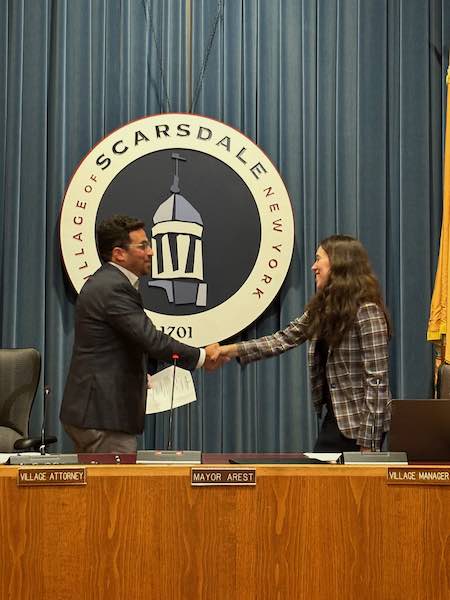 The following letter was written by Scarsdale Mayor Justin Arest and emailed to the residents of Scarsdale on September 11, 2024.
The following letter was written by Scarsdale Mayor Justin Arest and emailed to the residents of Scarsdale on September 11, 2024.
Dear Residents,
I am excited to announce the appointment of Ms. Alexandra Marshall as the new Village Manager of Scarsdale, effective immediately. This decision was ratified in a unanimous vote by the Village Board at our September 10, 2024, board meeting.
Over the course of the past year, beginning last fall, the Village Board conducted a nationwide search for a new Village Manager. We engaged the search firm SGR who brought 20 resumes to the board. Four candidates were interviewed and completed in-depth questionnaires and personal statements. Two final candidates met with stakeholders in both the community and staff as well as the full board in the spring. After much discussion and feedback from all involved, the board decided we had yet to find the right person for the position.
In June, as we continued our discussions as to how best to proceed, Ms. Marshall notified the Board that she would be interested in participating in the next iteration of the search for a Village Manager. Having already served in the position for eight months at the time, she knew she was ready to take on the role of Village Manager.
Over the course of the summer, the Board met with Ms. Marshall and conducted a formal interview. After successfully filling the role of Manager over the last year and serving our community effectively, the Board is confident that Ms. Marshall is the best person for the job.
Alexandra, or Alex as she is known to many, has been a vital part of our community for the past three years. She has served as Acting Village Manager for the last year, a role in which she has demonstrated exceptional leadership and commitment to our village. Before stepping into this position, Alex was our Deputy Village Manager for two years, where she played a crucial role in many of our initiatives and budget processes.
Before joining us in Scarsdale, Alex spent nearly six years in the Administrator’s office in the Village of Rye Brook, where she honed her skills in public administration and municipal management. Her experience, combined with her natural ability to listen and address concerns efficiently and effectively, has earned her deep respect among our department heads and village staff. Alex previously served as President of the Municipal Administrators Association of Metropolitan New York and is currently an Executive Board Member of the New York State City/County Management Association. She holds a Bachelor of Arts from Fordham University and earned a Master’s Degree in Public Administration at the College of New Rochelle.
Ms. Marshall is highly regarded by the Village Board, which recognizes her dedication to our village and the positive impact she has had on our community. Her problem-solving skills, professionalism, and approachable nature have made her an invaluable asset to Scarsdale.
We are confident that under Ms. Marshall’s leadership, our village will continue to thrive and that she will guide us with the same dedication and vision that she has demonstrated throughout her career.
Please join us in congratulating Ms. Marshall on her well-deserved appointment.
Now that we have filled the role of Village Manager, the search to find our next Deputy Village Manager will begin next week.
Fall Happenings at the Scarsdale Womans Club
- Details
- Written by: Joanne Wallenstein
- Hits: 1756
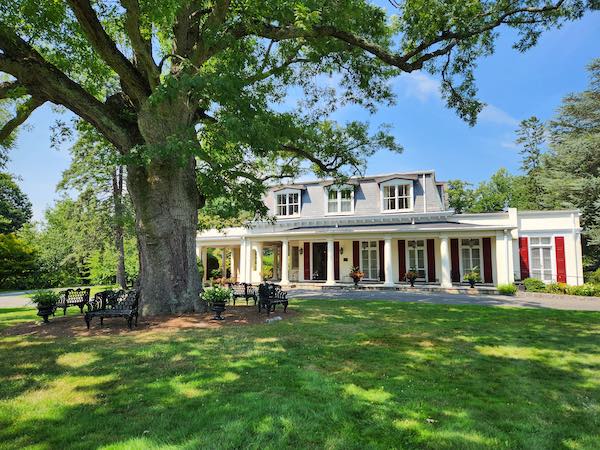 The Scarsdale Woman's Club is gearing up for a new year full of entertaining and educational programs and community outreach. All opening programs and most Wednesday programs throughout the year are open to the public free of charge at the Scarsdale Woman’s Club at 37 Drake Road in Scarsdale.
The Scarsdale Woman's Club is gearing up for a new year full of entertaining and educational programs and community outreach. All opening programs and most Wednesday programs throughout the year are open to the public free of charge at the Scarsdale Woman’s Club at 37 Drake Road in Scarsdale.
Everyone is invited to an open house and membership drive Tuesday, Sept. 24, from 1-4 pm. Members of club sections on art, literature and film, music, world culture and travel, home and garden, personal investing, pottery and food and dining will showcase their activities and answer questions. Attendees can learn about trips to theaters, museums and other places of interest; special events, and the club’s support of local philanthropies.
You don’t have to wait for the membership drive to sample the club’s diverse offerings. Here’s what’s on tap for fall:
Around the World Trivia will be presented by the club’s World Cultures and Travel Section Wednesday, Sept. 4, at 2 pm. Joanne and Steve Auerbach will lead a Jeopardy-style around-the-world trivia game in which everyone can participate. Bring your travel memories, your thinking caps and your sense of fun!
The club’s Art Section will host Page Knox, a popular speaker from the Metropolitan Museum of Art and adjunct professor of art history at Columbia University on Wednesday, Sept. 11 at 2 pm. She will give an illustrated talk on the Harlem Renaissance exhibit that recently closed at the Metropolitan Museum of Art. Whether or not you got to see this show at the museum, you will feel like you did through this engaging program.
The club’s pottery group will welcome everyone to the studio in the lower floor of the clubhouse for a tour and demonstration Thursday, Sept. 12, 10:30-12:30. Newcomers can try their hands at a simple project. No experience necessary!
“Olive Oil: Myths, Facts, Health Benefits” will be the topic of the Food & Dining Section on Wednesday, Sept. 18, at 2 pm. John Arlotta of Arlotta Food Studio will offer tasting samples, recipes, and a selection of items to buy.
Leslie Chang, a trustee of the Scarsdale Historical Society, will present a film entitled “Scarsdale in the 18th & 19th Centuries: From Hardscrabble Farms to Gracious Estates” at the Home & Garden Section opener Thursday, Sept. 19, at 2 pm. Houses to be discussed include Underhill House (c.1687), Wayside Cottage (c.1717), Burgess House (c.1750), Cramer Crane House (c.1851) and the club’s own Rowsley Cottage (c.1858).
The Literature & Film Section will present a poetry reading Wednesday, Sept. 25, at 2 pm. Kathleen Williamson will read from her poetry book "Feather & Bone." accompanied by images and bird notes from Saw Mill River Audubon executive director and photographer Anne Swaim.
Finally, the Alegria Ensemble will perform in the Music Section opener Tuesday, Oct. 1, at 2 pm. Previously known as the Balsam Trio, Alegría includes violinist Chloe Dickens, cellist Sara Strozzo and pianist Ricky Asher Moreira.
Looking ahead, the club is getting ready for the huge tag and book sale Oct. 19 and 20 that supports local charities, and our popular wine tasting and silent auction on Nov. 14 at 7 pm. Free admission to both events!
For more information, go to https://www.scarsdalewomansclub.org/. Our website is updated monthly. Or call 723-0024.
2024 Procedure Committee Invites Residents to Run for CNC
- Details
- Written by: Joanne Wallenstein
- Hits: 1673
To the Editor: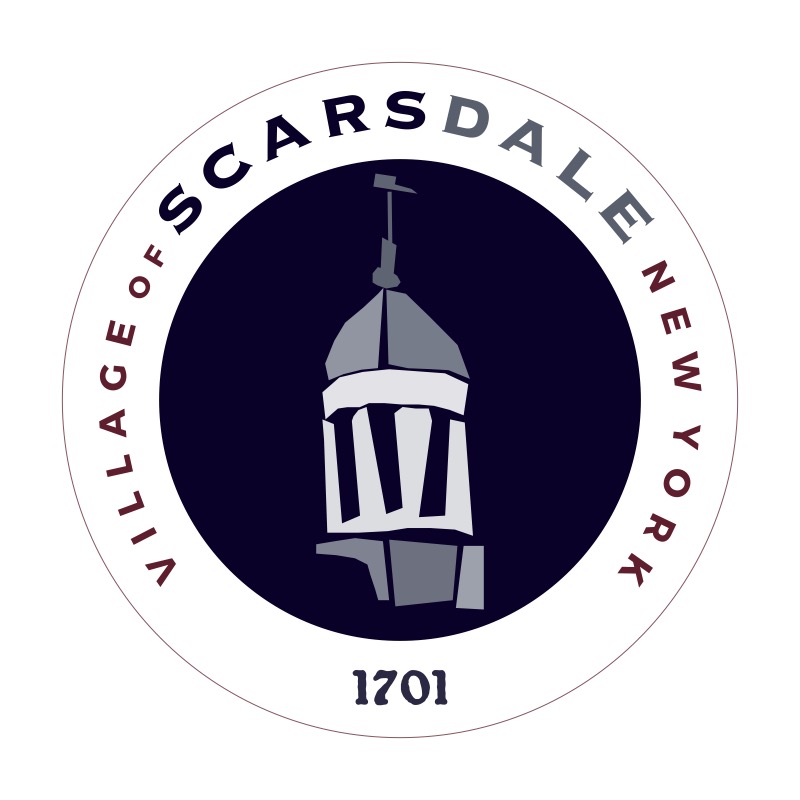
The Procedure Committee (PC) invites Scarsdale residents to run for a position on the nonpartisan Citizens Nominating Committee (CNC). Thirty voting members on the CNC, six representing each of the five elementary school districts, will interview, evaluate, and select candidates running on the nonpartisan slate for open Village offices in the March 18, 2025 Village Election.
A candidate for membership on the CNC must be a qualified voter (18 years of age or older) and a resident of Scarsdale for at least two years. The CNC application is simple, consisting of a biographical form and a 10-signature petition signed by the applicant’s neighbors. Instructions for filing can be downloaded on the PC’s website at www.scarsdaleprocedurecommittee.org. The deadline for submitting the CNC application is Monday, September 30, 2024. The CNC election will be held on Tuesday, November 12, 2024 from 7 am to 9 pm or by mail-in ballot.
The CNC meets 5 or 6 times on weekday evenings at 8 PM at the Scarsdale Library.CNC meeting dates for 2024-2025 are Wednesday, December 4th, 2024 (Organization Meeting); Wednesday, December 11, 2024; Wednesday, December 18, 2024; Wednesday, January 8, 2025; Wednesday, January 15, 2025; and if necessary, Wednesday, January 25, 2025. All meetings begin at 8 PM.. By its last meeting date the CNC will nominate a nonpartisan slate of candidates for the open positions on this year on the Scarsdale Board of Trustees.
For more information contact PC Chair Heath Sroka, [email protected] or PC Vive Chair Ralph Geer, [email protected] . The other members of the 2024-2025 Procedure Committee are: Elaine Weir, Manisha Maria, Rohini Shani, Rebecca Chase, David Peretz, Jeremy Perelman, Nikki Dragisty, Christopher Burrows, Matt Chesler, Andrew Gorrin & Andrew Sereysky.
Heath Sroka, Chair Ralph Geer, Vice Chair Procedure Committee






